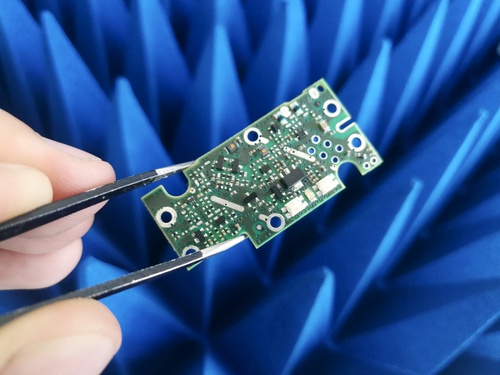New GB Standard GB4943.1-2022 for A/V Equipment and IT Products
Audio, video, information, and communication technology devices are subject to strict regulatory requirements in China and must usually receive a CCC certification. For more than 10 years, Chinese Guobiao Standards GB4943.1-2011 and GB8898-2011 have been defining technical requirements for these products. However, many of these products now fall under the standard GB4943.1-2022.

GB4943.1-2022 “Audio/video, information and communication technology equipment-Part 1: Safety requirements” became effective retroactively to Aug. 1, 2022, according to Announcement No. 11/2022 issued by the Certification and Accreditation Administration of the People’s Republic of China (CNCA) on Aug. 2, 2022. Certified companies are granted a transition period of two years until July 31, 2024 to renew existing certifications to the updated standard.
Numerous products in the audio, video, information, and communication technology sectors are required to have CCC Certification (China Compulsory Certification) for the Chinese market. They include computers, printers, scanners, copy machines, CD players, speakers, keyboards, televisions, monitors, and many more.
The overall modification of the former national standard aligns closely with the international IEC standard IEC 62368-1:2018. Some of the changes in the updated standard include the classification and assessment of various hazard sources, which have now been divided into six categories, namely: Electricity-induced injury, electricity-induced fire, injury caused by harmful substances, mechanical injury, thermal burns, as well as sound and light radiation. GB4943.1-2022 requires appropriate precautions as part of the safety engineering, depending on the hazard source.
The requirements for the safety of battery-powered devices have been expanded, too, especially regarding protection against overcharging, high temperatures, and ignition. Here, the focus lies on avoiding hazards from external metal objects, for example, keys or necklaces.
Further changes concern A/V and ICT devices, which are usually operated outdoors, as well as devices with button cells, specific grounding, and many more. For example, wireless energy transmitting devices must be able to detect external metal objects and interrupt any energy transmission to them in time.
All of these changes are relevant not only for certified manufacturers of corresponding devices, but also for their customers and involved suppliers.
The Chinese GB Standards and Implementation Rules are regularly updated by the authorities, often having considerable implications for product manufacturers. Updates are usually not announced and must be independently tracked and implemented by certified factories. Failure to do so may result in severe consequences, including cancellation of certification.
MPR China Certification GmbH will inform you as early as possible about any changes to the GB Standards and Implementation Regulations relevant to you. In the case of modifications to the content, we will be happy to check the relevance for you individually. This is enabled through our long-term relationships with the certification bodies and close coordination with the relevant authorities and test laboratories. Our services allow you to focus on your core business by protecting you from potential certification-related consequences in your China affairs.
BSMI Updates Technical Specification for Verification and Inspection of Equipment for Electric Vehicles
In February 2022 BSMI in Taiwan updated the technical specification for the verification and inspection of electrical vehicle supply equipment (EVSE).
This technical specification applies to electric vehicle (EV) supply equipment, which includes, but is not limited to, equipment for charging electric vehicles with a specified nominal supply voltage and a specified nominal output voltage, which must be subject to testing and inspection.

As a rule, a transition period is always granted by the Taiwanese authorities until the technical specifications or regulations then come into force. In this case the update will be implemented from January 2023 and will apply to both Taiwanese manufactured and imported EVSE.
The technical specification has been formulated with reference to the following international regulations and technical specifications:
| No. | Standard | Titel |
| 1 | IEC 62052-11:2020 | Electricity metering equipment – General requirements, tests and test conditions – Part 11: Metering equipment |
| 2 | IEC 62053-21:2016 | Electricity metering equipment (AC) – Particular requirements – Part 21: Static meters for active energy (classes 1 and 2) |
| 3 | IEC 62053-41:2020 | Electricity metering equipment – Particular requirements – Part 41: Static meters for DC energy (classes 0,5 and 1) |
| 4 | National Institute of Standards and Technology Handbook 44, §3.40, 2019 | |
| 5 | PTB-A 50.7 | Requirements for electronic and software
controlled measuring instruments and auxiliary equipment for electricity, gas, water and heat |
| 6 | CNS 15511-1:2021 | Electric vehicle conductive charging system – Part 1: General requirements + Amendment 1 |
| 7 | CNS 14607:2017 | Static electricity meters |
Depending on the product there are various certification requirements in Taiwan for which different authorities are responsible. In the automotive sector, the VSCC is primarily responsible, but also BSMI. The relevant authorities or certifications must be checked with the authorities. In some cases, only one certification is sufficient to be able to market the product in Taiwan.
If you are unsure whether your product needs to obtain BSMI certification or VSCC certification, please do not hesitate to contact us. We will be happy to assist you in determining which certification requirements apply to you.
Please contact us with any questions regarding VSCC or BMSI certification. You can contact us by e-mail or call us at +49 (0) 69 271 3769 150 (EU) or +1-773-654-2673 (US).
Introduction of 8 New Mandatory Standards for Automotive CCC Certifications
China’s National Certification and Accreditation Administration announced the publication of 8 existing mandatory GB standards that will be newly added and applied to CCC certification of automotive products. This was published under Notice No. 9, 2022 on July 8, 2022.
The following information was announced:
- 8 existing standards are added to the China Compulsory Certification Implementation Rules – Automobile (CNCA-C11-01: 2020), which complement the existing standards.
- Certification bodies may add these 8 standards to the existing standards as a regulatory basis for certifications from the date of publication of this notice until June 30, 2023 for newly accepted certification applications and on a voluntary basis from the corporate side. Beginning July 1, 2023 certification bodies must apply all standards, including the 8 new ones, to newly applied for certifications.
- Mandatory product certifications do not need to be renewed for affected products if they were supplied, sold and/or imported before July 1, 2023. However, they must continue to be compliant with existing laws and regulations.
- Issued and valid certificates can continue to be used. Certification bodies should use natural transition methods as opportunities for updating the featured standards, such as renewal of certificates due to expiry, annual surveillance or product changes.
Please do not hesitate to contact us for further details and consultation. You can contact us via e-mail, or call us (UK: +44 2071931135, Rest of Europe: +49 69 2713769150, US: +1 773 654-2673).
Here is an overview of the newly added mandatory standards for CCC certification of automotive products:
| No. | Standard No. and Standard name | Implementation requirements |
| 1 | GB/T 38694-2020 Requirements and test methods of alert for vehicle turning right | According to the clause 8.6.7 of GB 7258-2017: Trucks with a total mass greater than or equal to 12000kg should be equipped with a vehicle right turn tone system that meets the requirements of the standard. |
| 2 | GB/T 38185-2019 Performance requirements and testing methods for electronic stability control system (ESC) for commercial vehicles | According to the clause 4.17.4 of GB 7258-2017, passenger cars with a height greater than or equal to 3.7 m without a passenger standing area should be equipped with an electronic stability control system. |
| 3 | GB/T 38186-2019 Performance requirements and test methods for advanced emergency braking system (AEBS) of commercial vehicles | According to clause 4.17.3 of GB 7258-2017, the road bus and tourist bus that are longer than 11 m shall be equipped with an automatic emergency braking system that meets the requirements of the standard. |
| 4 | GB/T 38796-2020 Performance requirements and test methods of automobile blow-out emergency safety device | According to the clause 9.2.4 of GB7258-2017, the steering wheels of the following three vehicles: specialized school buses and the buses with a length of greater than 9 m without passenger standing areas and dangerous goods transport trucks with a total mass greater than 3500 kg, should be equipped with tire puncture emergency protection devices. |
| 5 | GB/T 38892-2020 On-board driving video recording system | According to the clause 8.6.6. of GB 7258-2017: passenger cars should be equipped with an event data recording system (EDR) in accordance with GB 39732; If it is equipped with an on-board video driving record system that complies with GB/T 38892 regulations, it shall be deemed to meet the requirements. |
| 6 | GB 39732-2020 Vehicle event data recorder system | According to the clauses 8.6.5 and 8.6.6 of GB 7258-2017, passenger cars should be equipped with an event data recording system (EDR) in accordance with GB 39732; If it is equipped with an on-board video driving record system that complies with the provisions of GB/T 38892, it shall be deemed to meet the requirements; Other buses with a length of less than 6 m should be equipped with a driving recorder that complies with GB/T 19056 and GB 7258 or an event data recording system (EDR) that complies with the standard regulations. |
| EDR which is corresponding to GB 39732-2020 “Automotive Event Data Recording System” and DVR which is corresponding to GB/T 38892-2020 “Vehicle Video Driving Recording System”, are independent inspection items, companies can choose one of the standards for inspection, and provide the corresponding inspection and testing report. | ||
| 7 | HJ 1137-2020 Measurement Methods for Non-Regulated Emissions from Methanol Fueled Vehicles | |
| 8 | GB/T 39132-2020 Fuel cell electric vehicle engineering approval evaluation program | The Standard only enforces clause 5.3.3.3. |
New EMC and Safety Norms GB/T 9254.1-2021 and GB 4943.1-2022 for communication equipment
On 1 July 2022, the new Chinese EMC standard GB/T 9254.1-2021 became effective. The new standard for electromagnetic compatibility (EMC) corresponds to the international standard CISPR 32:2015. A total of four national standards, GB 4943.1-2011, GB 8898-2011, GB/T 9254-2008 and GB/T 13837-2012, have been revised and partially consolidated, resulting in the new standards GB/T 9254.1-2021 and GB 4943.1-2022. The corresponding implementing regulations CNCA-C08-01:2014, CNCA-C09-01:2014 and CNCA-C16-01:2014 have also been revised.
Most information technology equipment needs CCC certification in China. Previously certification was divided according to product category. Standard GB/T 9254-2008 regulated the EMC guidelines for general information technology equipment, while standard GB/T 13837-2012 was specifically aimed at television and radio equipment.

The new standard now combines the two into one standard. As a result, the requirements for devices have also changed slightly, but overall, the new standard makes the CCC certification itself more clear and more uniform than before.
Moving forward, all new certification applications must be submitted under the new standard. At the same time, Chinese authorities granted a generous transition period for existing CCC certifications. All CCC certificates must then be updated to the new standard by July 31, 2024. This transition period is intended to facilitate the renewal of certificates and keep the associated costs low.
Manufacturers whose CCC certificate is still based on the old standard must adapt their certificates to the new standards. This requires an application and a corresponding product test.
| List of standards for Compulsory product certification of audio and video equipment | ||||
| Product types | Safety Standards | EMC Standards | CNCA Implementation Rules | |
| 1 | Active loud speaker systems having single or multiple speaker with max. output power under 500W (R.M.S.) | GB 4943.1 | GB/T 9254.1
GB 17625.1 |
CNCA-C08-01:2014 |
| 2 | Audio power amplifier | |||
| 3 | Various carrier forms of audio and video recording, playback and processing equipment (including various types of optical discs, tapes, hard drives and other carrier forms) | |||
| 4 | Color TV receivers and TV set-top boxes for various imaging modes | |||
| 5 | Electronic piano | |||
| 6 | Power adapter for Audio and video equipment power adapter ( including charger / discharger ) | |||
| List of standards for Compulsory product certification of information technology equipment | ||||
| Product types | Safety Standards | EMC Standards | CNCA Implementation Rules | |
| 1 | Microcomputer | GB 4943.1 | GB/T 9254.1
GB 17625.1 |
CNCA-C09-01:2014 |
| 2 | Portable computers | |||
| 3 | Display device used in conjunction with a computer | |||
| 4 | Printing device used in conjunction with a computer | |||
| 5 | Multi-purpose printing copier | |||
| 6 | Scanner | |||
| 7 | Server | |||
| 8 | The power adapter for information technology equipment (including charger/discharger) and built-in power supply for computer/server | |||
| List of standards for Compulsory product certification of telecommunication terminal equipment | ||||
| Product types | Safety Standards | EMC Standards | ||
| 1 | Fax | GB 4943.1 | GB/T 9254.1 | |
| 2 | Cordless telephone terminal | GB/T 19483 | ||
| 3 | Mobile user terminals | GB/T 19484.1 GB/T 22450.1 YD/T 1592.1 YD/T 1595.1 YD/T 2583.14 YD/T 2583.18 |
CNCA-C16-01:2014 | |
| 4 | Data terminal | GB/T 9254.1 | ||
| 5 | Multimedia terminal | GB/T 9254.1 | ||
For more information on how CCC certification, the CCC Self-Declaration and voluntary CCAP or CQC certification may affect your company, or for more information about CCC certification in general, the process, and the associated costs, please visit our website and our News Section where you will find current updates twice a week.
Please do not hesitate to contact us for further details and consultation. You can contact us via e-mail, or call us (UK: +44 2071931135, Rest of Europe: +49 69 2713769150, US: +1 773 654-2673).
Please don’t hesitate to also use our chat-window in the bottom right corner if you have any questions. (Please check your browser settings if you can’t see the window)
You can also check out our free CCC-Brochure, which can be downloaded right here as a PDF file or you consult our book (in English) “A Brief Guide to CCC: China Compulsory Certification”, which can be found directly here on Amazon.
Here you can download our brochure about the CCC Self-Declaration.
Here you can download our brochure about the voluntary CCAP or CQC certification.



